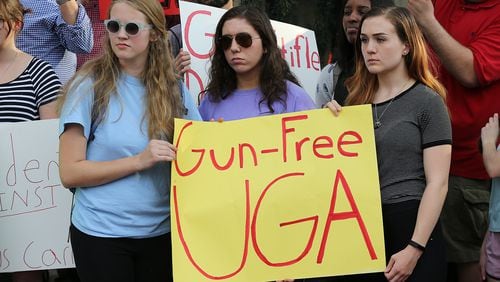The AJC welcomed a dozen talented college interns this summer, including Nathan Harris of the University of Georgia. Harris is a senior journalism major, who has been covering campus carry and gun topics for the Red & Black newspaper for three years.
With campus carry about to become the law in Georgia Saturday, Harris addresses the implications and the experiences of other states that allow guns on their public colleges and universities.
This is his first column for the Get Schooled blog. I hope for more from him and the other interns. If you want to read more about the nuts and bolts of the new law, go to this excellent AJC news story.
By Nathan Harris
Back when the campus carry law was just a bill, I spoke frequently with both proponents and opponents of the idea of guns on college campuses. I often found, however, the legislation was just a foil for the larger national conversation about the Second Amendment overall. This wasn't about self-defense versus a potential mass shooting; this was a battle between those who owned guns versus those who would never think about touching one.
Some opponents, however, floated the argument that a sudden influx of armed students would push others to become armed, until everyone is walking around with a holster on their belt. Proponents were more conservative in their predictions, suggesting that while the law may motivate some to get a permit, those that carry on campus would mostly be those that already carry off-campus.
Credit: Maureen Downey
Credit: Maureen Downey
"The vast majority of people that will carry on campus already carry," said Luke Crawford, the Georgia director for Students for Concealed Carry. "But we may see some increase in urban campuses like in Atlanta. They'll start carrying because they now can in an area that they deem unsafe."
So will students rush to courthouses to be loaded to the teeth, or will the percentage of those carrying on campus merely reflect the current percentage off-campus?
First off, just how many people are carrying?
This is difficult to answer, since Georgia law prohibits carry license numbers from open records. The most accurate number we have may be from a 2011 Government Accountability Office report, which showed 600,000 active permits that year, out of roughly 6.68 million Georgia residents 21 years or older. That amounts to just under nine percent of all those eligible to carry, or one out of every 11 people 21 years or older.
So just how big might the "sudden influx" of carrying students be on July 1?
According to 2011 data from the National Center for Education Statistics, there are roughly 532,500 college students in Georgia. Using the University of Georgia as an example of age demographics at a college in Georgia -- admittedly, the number may skew even older when taking into account technical and community colleges -- roughly 53.5 percent of students are 21 years or older.
So, if 53.5 percent of Georgia students are able to carry, and assuming the same nine percent of those qualified actually carry, that's roughly 25,500 Georgia college students who are already carrying, or about one out of every 20 students.
But is this number set to grow now that guns are allowed on campus? To answer that, let's look at three other states, Utah, Colorado and Texas, before and after they allowed campus carry.
Allow me to preface this with the fact that correlation does not mean causation. There is virtually no way to prove that campus carry is the primary driving force behind these numbers.
With that in mind, let's look at Utah, the first state to allow concealed carry on college campuses in May 2004. According to the state's Bureau of Criminal Identification, the number of permits issued each year leading up to 2004 remained stable around 63,000. By the end of 2004, after a fall semester with guns allowed on campus, that number went up to 65,000. In 2005, it went to 72,500, and in 2006 it reached 86,000, an increase of over 30 percent in two years.
The same seems true in Colorado, whose state Supreme Court overturned a ban on campus carry in March 2012. The two years prior saw 21,000 permits issued each year. By the end of 2012, that number was at 32,500, with 2013 seeing a spike to 63,000 and 2014 seeing 44,000. According to the Denver Post, changes to state background checks in 2013 likely motivated that year's spike, but after two years of campus carry in effect, there was a similar 30 to 35 percent increase in carry permits.
That brings us to Texas, which just implemented campus carry in August 2016. Since permit reports from the state's Department of Public Safety go by fiscal year, there are no numbers yet showing the first full school year of campus carry. The 2016 fiscal year report, however, goes to the end of August, or the first few weeks of the school year.
Luckily, the Texas reports are broken down by age. Here we can see specifically the number of applications among 21-, 22-, and 23-year-olds, likely ages of college students that could carry. Specifically among that age group, the number of permits issued hovered around 8,000 yearly for the three years leading up to campus carry. Between September 2015 and August 2016, including just a month of campus carry in effect, this number jumped to nearly 13,000, close to a 50 percent jump.
The number of permits issued in Texas that same period across all age groups collectively jumped about 50 percent, meaning campus carry may not have necessarily been the driving factor behind the increase.
All in all, however, between Texas in the short-term and Utah and Colorado in the long-term, there is a numerical correlation between campus carry going into effect and an increase in the number of people getting carry permits.
So just how many people are going to carry on Georgia campuses? Ultimately, we may never know. To comply with the law and avoid carrying in classrooms with dual-enrolled high school students, students can visit an institution's registrar to see if they have any classes that may be an issue. Institutions, however, are prohibited from keeping a record of those who ask.
So just like any city in Georgia, people all around could be carrying guns without anyone else knowing. Then again, that's the point.
About the Author








